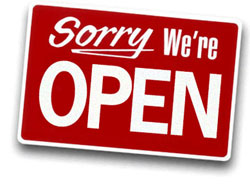With respect to theological considerations, open theism has a quite narrowly defined project:
What these theologians are interested in is basically two things: the will of God as it relates to free rational creatures and the question of what God knows and when he knows it. So open theism has to do, above all, with the doctrines of providence and divine foreknowledge. … The basic intuition is that the future is “open” not only for us but also for God. … Open theists hold…that an exhaustive divine foreknowledge is logically incompatible with human freedom.[1]
Again, McCormack is concerned that the open theists’ method compromises their Christology, and so threatens their entire endeavour:
I regard the lack of an adequate Christology—i.e., one which gives comprehensive attention to the problem of the ontological constitution of the Mediator—to be the single biggest defect in open theism; one which threatens to undermine the entire scheme and render its justified protest against classical theism ineffectual.[2]
It is clear from this statement that McCormack is sympathetic to the open theists’ aim but also rejects their approach to the matter. Addressing the work of Clark Pinnock particularly, McCormack finds that he holds a “fairly classical understanding” of the divine attributes. Although God is said to “suffer,” Pinnock evidently means by this, a kind of suffering distinct from the divine being: “What God is, it would seem, is something that is complete in itself, above and prior to any experience by God of suffering and pain.”[3] The Son who becomes incarnate also puts aside the use of any divine attributes which would conflict with his experience of being human. In this form of kenotic Christology, suggests McCormack, Jesus suffers humanly but his suffering as such has no impact on what the Logos is essentially, and so no effect on the divine nature.[4]
McCormack notes that the open theists’ Arminian account of salvation also drives their doctrine of providence: the way God works in conversion is typical of the way God works with human beings generally.[5] God limits his own power in order to provide space for the relative independence of human creatures, and then deals with them by means of persuasion.
Quite clearly, God’s will is a work-in-progress—and on this point, open theism is in agreement with process theology. “God has the power and ability to be (in Harry Boer’s words) an ‘ad hoc’ God, one who responds and adapts to surprises and to the unexpected. God sets goals for creation and redemption and realizes them ad hoc in history. If Plan A fails, God is ready with Plan B.”[6]
The open theists’ commitment to an open future entails a rejection of exhaustive divine foreknowledge, possibly their most controversial claim. The Achilles heel of this position for McCormack is that they confuse “certainty” with “necessity.” He borrows this distinction from William Lane Craig who argues that certainty is a predicate of persons, and so God’s certain knowledge of what will transpire in time does not render those things “necessary,” for they will occur as a function of the natural and historical conditions under which they take place.[7]
In his final assessment of open theism McCormack calls upon them accept wisdom of the church where it has spoken formally concerning the relevant topics. Here, the open theists’ Arminianism is not of concern for the Council of Orange decided that those who held to conditional or unconditional forms of election may be upheld as orthodox.[8] The same cannot be said with respect to their denial of exhaustive divine foreknowledge: “The truth is that the doctrine of an exhaustive divine foreknowledge enjoys fairly widespread ecumenical support, having been affirmed by both the Reformed and the Roman Catholics.”[9] In a quite remarkable statement that indicates something of McCormack’s understanding of theological authority, he writes,
Pinnock would, no doubt, dismiss the Westminster Confession as a Presbyterian confession without significance for his church and the churches of his allies. But given the radically divided nature of Protestantism in the West today, it seems to me…the better part of wisdom to grant to the teaching office in Rome relatively binding authority on questions in relation to which no existing Protestant confession has taken a different position.[10]
Thus McCormack faults open theism for the rejection of one element of classical theism which he suggests must certainly be upheld.[11] He remains sympathetic to their rejection of “a putative divine impassibility and timelessness” but suggests that such a case must be built on an entirely different metaphysical platform. In the end, open theism remains wedded to the essentialist presuppositions of classical theism and as a result cannot prosecute their case coherently. McCormack will go on to explore how Karl Barth’s actualistic conception of divine being might more fruitfully be applied to issues of interest to the open theists though without sacrificing either divine foreknowledge or immutability.[12]
[1] McCormack, “Actuality of God,” 190.
[2] McCormack, “Actuality of God,” 201, original emphasis.
[3] McCormack, “Actuality of God,” 199, original emphasis.
[4] McCormack, “Actuality of God,” 199.
[5] McCormack, “Actuality of God,” 203.
[6] McCormack, “Actuality of God,” 203, citing Pinnock in The Openness of God, 113.
[7] McCormack, “Actuality of God,” 205.
[8] McCormack, “Actuality of God,” 207.
[9] McCormack, “Actuality of God,” 209.
[10] McCormack, “Actuality of God,” 209.
[11] McCormack, “Actuality of God,” 210.
[12] McCormack, “Actuality of God,” 209-210.

For an open theist response to McCormack, there’s this:
https://anopenorthodoxy.wordpress.com/2014/05/01/mccormacks-barth-open-theism-part-2/ (See Parts 1 and 3 as well).
Tom